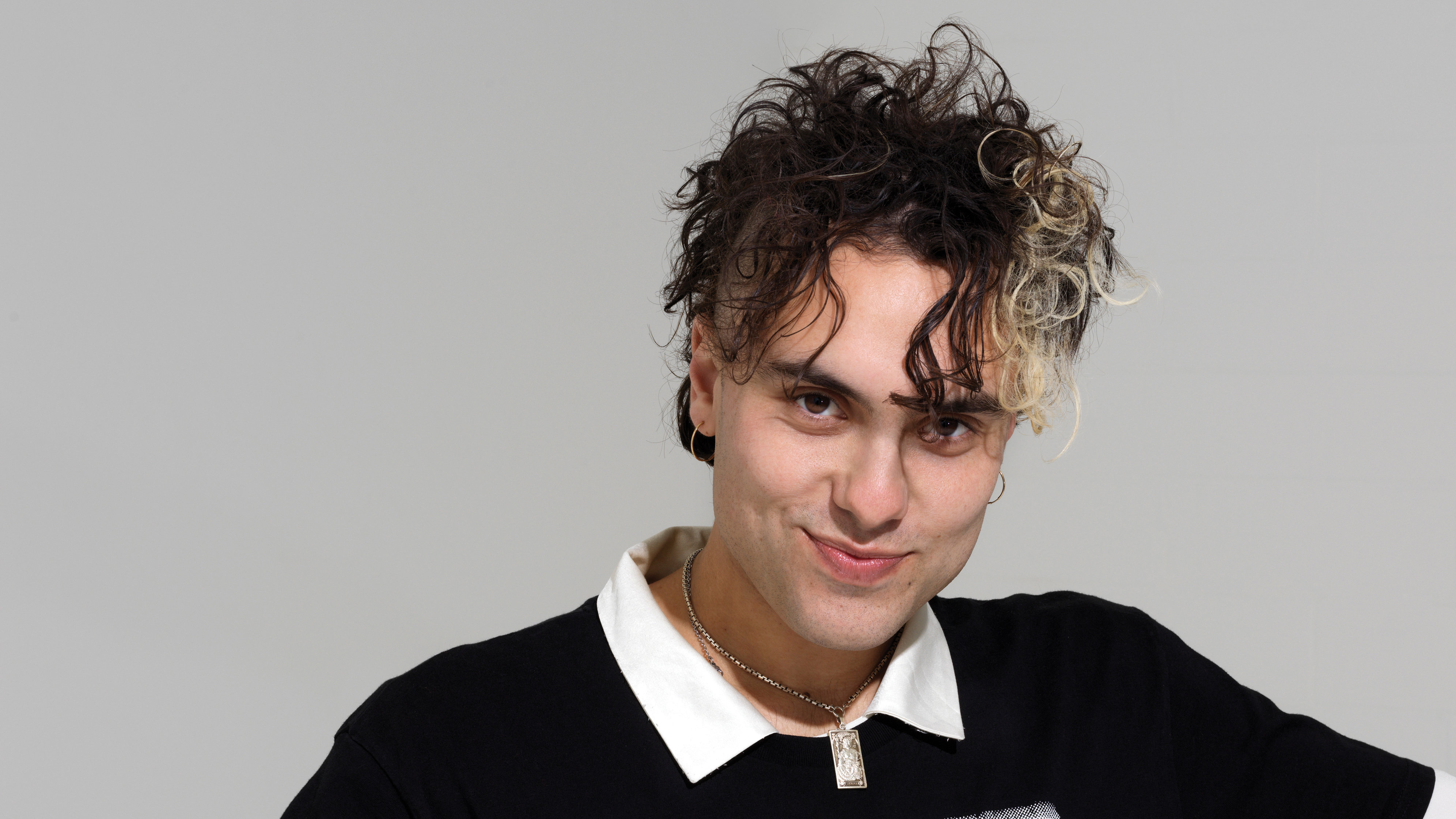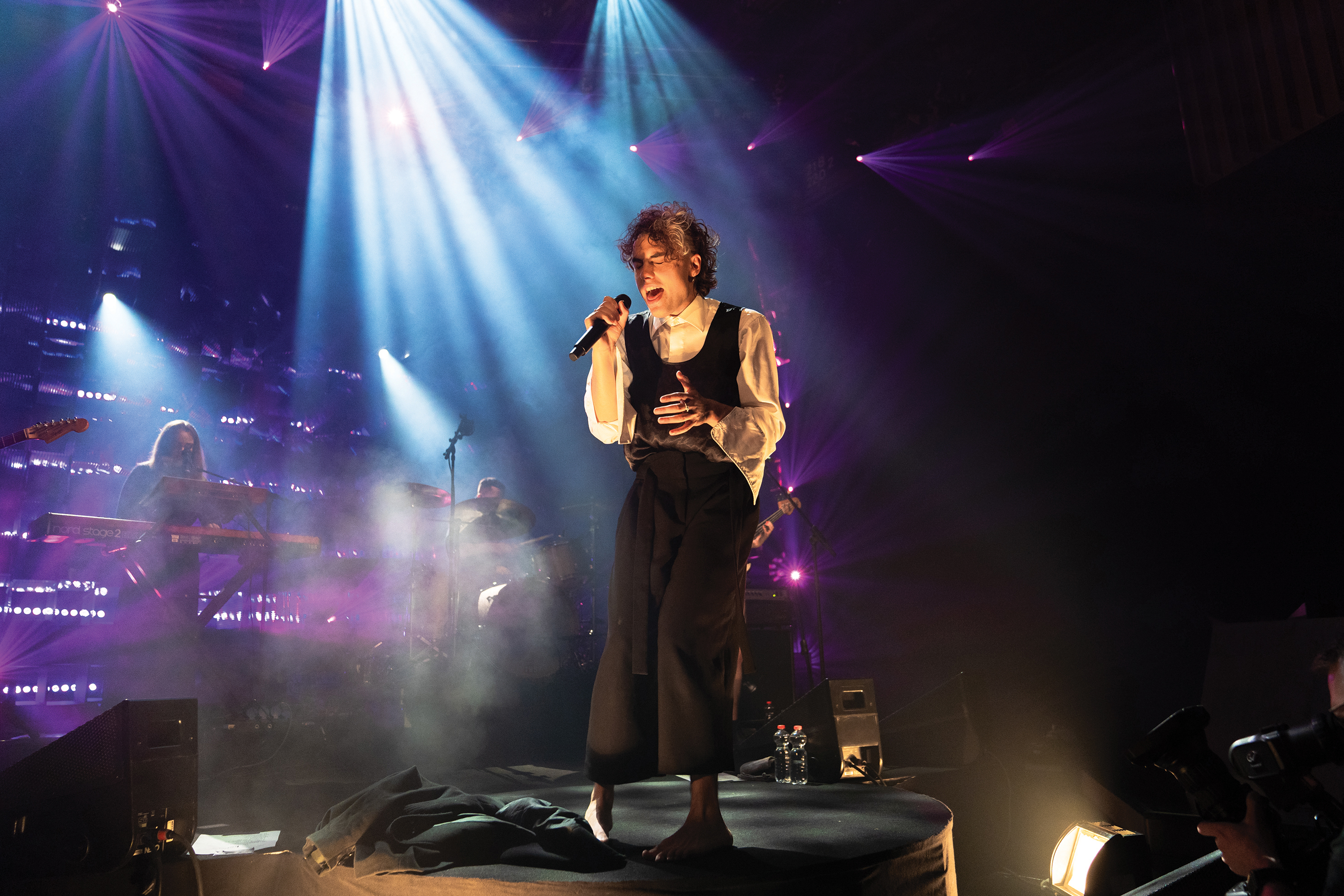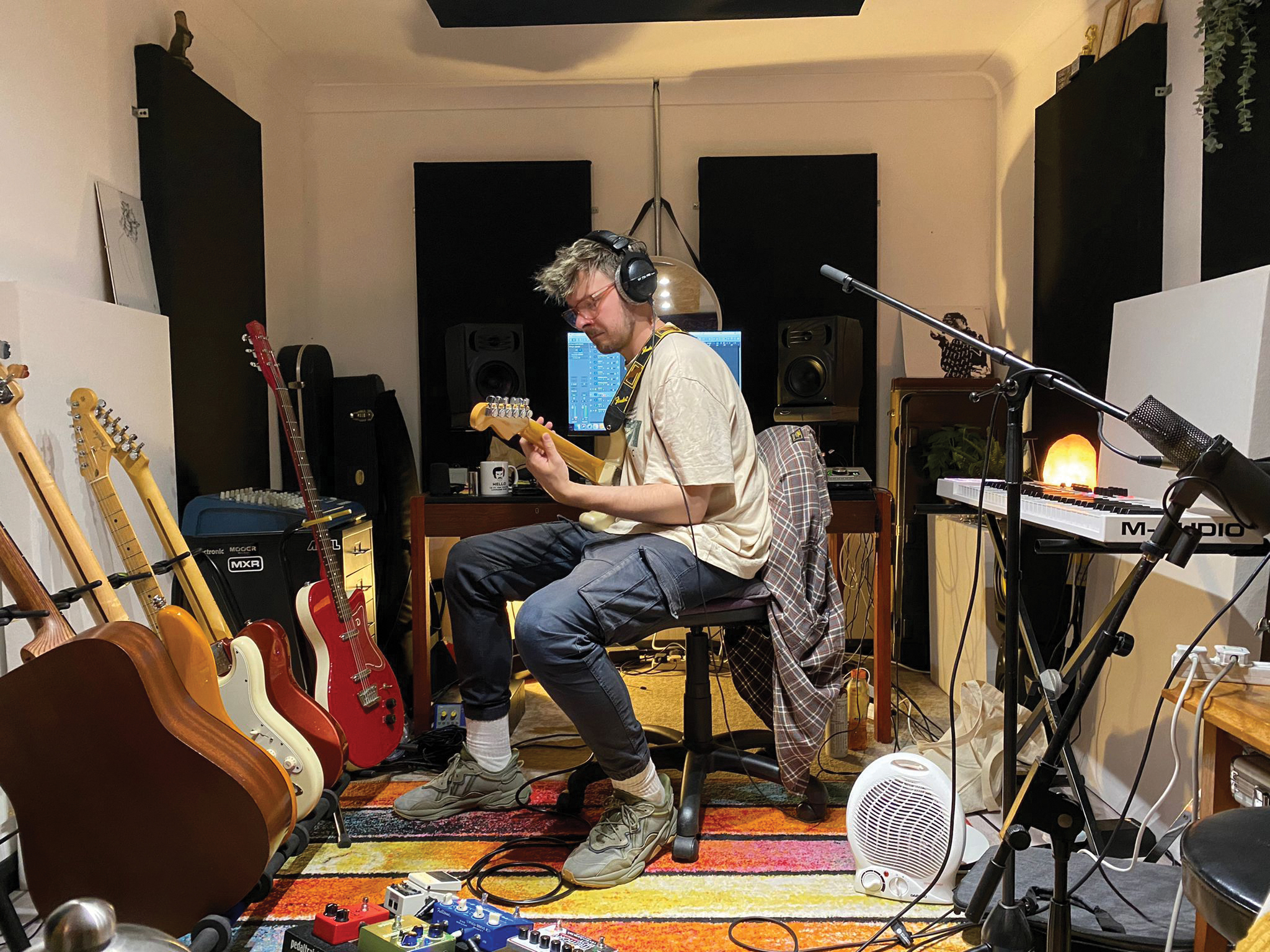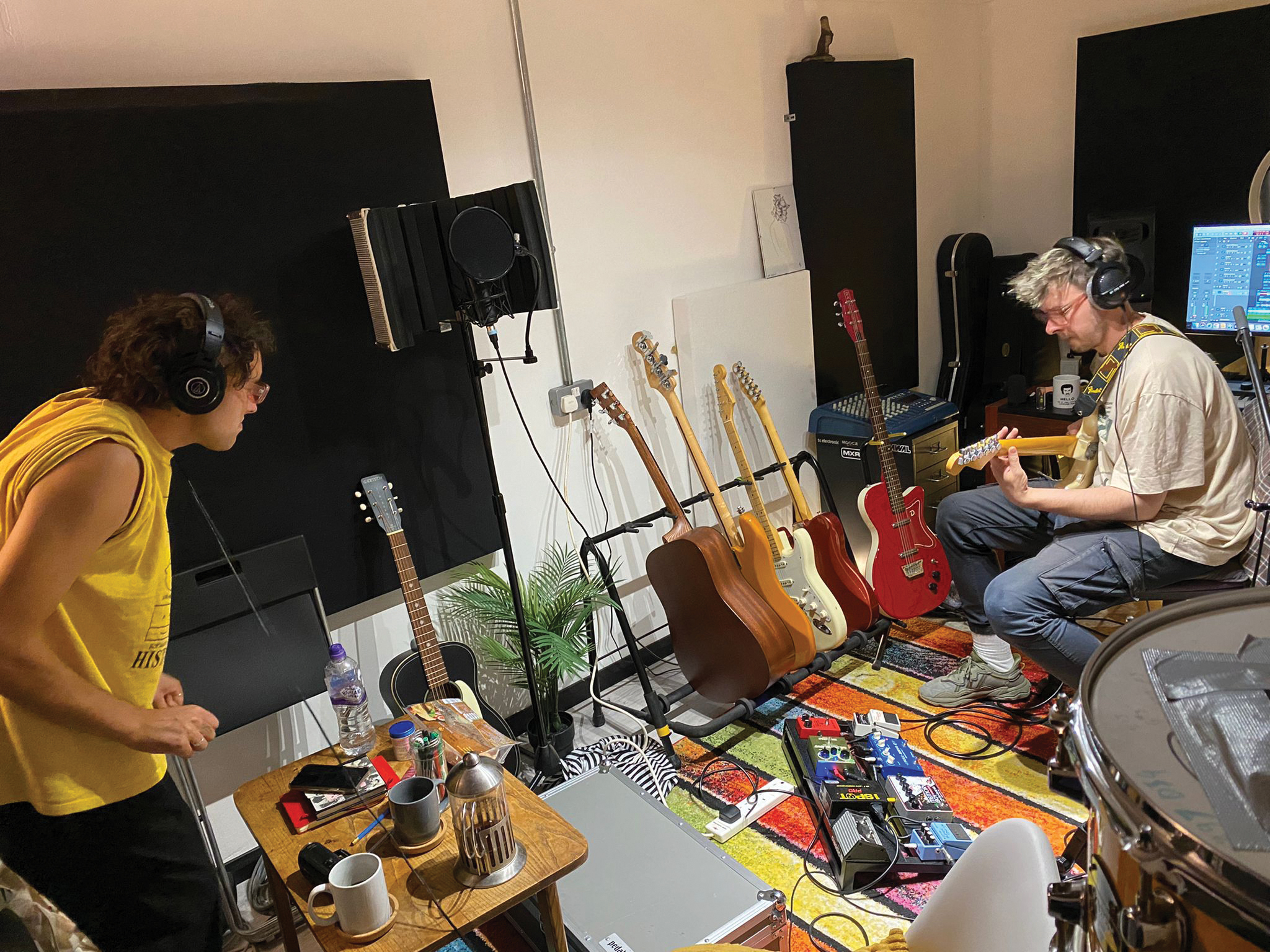Keir on the power of GarageBand, his 'magic' AKG C414 microphone and writing a song a week for five years
We spoke to the rising singer-songwriter alongside writing partner and producer George Glew to learn about the lengthy process of making his debut album

Want all the hottest music and gear news, reviews, deals, features and more, direct to your inbox? Sign up here.
You are now subscribed
Your newsletter sign-up was successful
Seizing our attention upon the first spin of his single Lemonade earlier this year, Keir evokes the flamboyance and bombast of such stadium-appeasing icons as David Bowie, Freddie Mercury and Prince with an emotional, empathetic through-line, dealing with complex themes, including struggling with mental health-related issues. All of which sits within some very elegantly-sculpted mixes.
Alongside his songwriting partner and production-guru George Glew, Keir’s songs have been generating serious buzz across the music press for the last year, with his debut self-titled album released over the summer.
We spoke to Keir and George right on the cusp of its release, to learn about their collaborative writing process, how they arranged the tracks to accentuate Keir’s immense voice, and the broader themes resonating from Keir’s work.
Keir, how did it all start for you?
Keir: “I was a very lucky person in that I never really played with the idea of doing anything else. I was a support worker with autistic people for a little bit while I was studying at uni. But studying in a small town, as a teenager I was just obsessed with the idea of making songs. You might learn covers but actually I was really, really young when I got intrigued by ‘making’ songs and telling some sort of story. People around me, like my brother and my family, didn’t laugh at me; they encouraged me.
“About five years ago I met George, who became my main songwriting partner and the person that I’ve written this whole album with. We made a song a week for about five years. Loads of bad material, of course, but it meant we could pick and choose the 11 songs on this current album.”
George: “When we realised we both did music we made a few things back in my old home studio. We made his first single Shiver on the first day we did a session together. It was very natural. We’ve always worked together well, it all happened organically and it didn’t come from any kind of management.”
How do you two typically work together, how do you divide up who does what in the studio?
K: “We get in the room, we’re very open and very instinctive. He knows chords better than me. It’s a strange thing, I can kind of feel the direction more but George can tell me what I’m actually doing. I’ll normally take melodies and lyrics and the overall ‘idea’: ‘what is the story or narrative?’ Sometimes these things develop as the songs develop, though. For me it has to be a collage. I can’t write very ‘literal’ lyrics, there needs to be a bit of subconscious mystique to them or I can’t really do it. ”
How long has the album been in the works?
K: “About six years; it’s a life’s work! It’s the first one. We just kept writing that mountain of songs, hoping we’d one day be able to do this. We didn’t bother ourselves with asking ‘what is this?’. I think that sort of over-analysis can sometimes make things sound shit. The whole point is that you’re expressing something. That is the definition of freedom.”
Want all the hottest music and gear news, reviews, deals, features and more, direct to your inbox? Sign up here.

Where was it recorded?
G: “I’ve got a studio within a complex of studios. That’s where we made the album, we did most of it there. We did drums at Mizpah Studios in Bath. Most of the tracks were run off demos that we’d made in various rooms over many years, and none had real drums, then getting the sound we wanted with the drums with Marc MacNab was brilliant. He’d know what drum sounds to get.
“With the drums it’s quite specific for the track, there’s quite a few different drum sounds in there. There are no samples, aside from the song Bulletproof, it’s mainly ‘what you hear is what you get’. On Lemonade, that’s just the kit without samples helping it out. We also went into Invada Studios in Bristol to do part of it. We did piano/keys and Rhodes, Farfisa and Moog stuff, they’ve got a great gear selection.”
Lemonade is extraordinary. How did the idea for it first form?
K: “It’s kind of white noise to me, because when you take songs through the mixing process and the mastering process you end up being quite bored by them. But that one, more than any other, I was able to hear it post-release and feel like it was actually quite audacious. It’s theatre, it’s Freddie, it’s all the things I love. The verse is a little bit sexy, but the chorus is massive. I love that. I feel confident to speak like that in music. I don’t know why. I’m quite an introverted person in real life but within songs I can shout ‘Is it love?’ And deal with those bigger concepts.”
When you were making the tracks what software did you use?
G: “I used Logic. We used quite a few software instruments on the record, we’ve used Omnisphere to augment the band sound. UAD plugins were central for doing a lot of the mixing. We used some Arturia softsynths. I tend to make a lot of sounds in the room and then sample them. I’m a big Plugin Alliance fan, their stuff is mad good. ”
In terms of the vocal production, how did you work to make your voice stand out as much as it does?
K: “I’m pretty unfussy. Recording vocals is like homework but worse, I hate doing it! The writing process is great, but I lose my patience after about 50 takes. Give me a mic and I’ll do it. We’ll try a few things out. I then might have strong opinions on the sound of it. We don’t want things to sound too wet and also I like things to not be too perfect, leaving in the odd bum note.
“I have strong opinions, but I’m not that fussy. We used an AKG C414 for a lot of stuff, my manager gave me an old Japanese one. Something was gone inside of it, but I loved its sound. I wouldn’t give it back to my manager, I told him ‘there’s magic inside of this thing’. I might have a rough idea, but then George will get his chisel out and dig in to get the good stuff out of it.”
G: “For the chain for Blood in the Water, we wrote that song when lockdown was easing up, and we used the original vocal. We did it at Keir’s parents’ house. His dad deals in mattresses, so we used some of those to pad out the small office and make some DIY acoustic treatment. We used a 414 on his vocal into a Focusrite ISA-1 and then a Warm LA-2A. To be honest, it didn’t really hit the LA-2A much, and I probably wouldn’t use that now. It was very much a figuring things out process. But the vocal sounds great on that.”

Which of the songs took the longest to get right?
K: “Possibly Shame, the final track. We went through a little phase of doing a kind of Jeff Buckley-style breakdown into a sort of atonal madness. Because it was the last song we thought we’d got a bit absurdist, and have a middle eight that lost all sense of time before you sink into the final chorus. In the end we realised we just didn’t need it. We’ve been trying to keep things simple, even though songs like Lemonade are quite out there and theatrical. I still wanted it to be as simple as possible.”
G: “Also, Bulletproof – that was really hard. We did a lot of changes in that track. It goes nothing to everything, and I wanted to keep the drums live but feel a little bit more sampled in a way. I probably would do it in a much simpler way now, but we tried to loop stuff to make it feel more beat-locked, but keep it live. We added an 808 kick to make it more impactful. It adds weight. There’s a producer called Fred Cox (NoisyFred) who has these Sample Shed sample packs. We used a few of those because they’re really great.”
What mixing tools did you use to hone the tracks in-the-box, George?
G: “Pulteq EQ emulations were quite important. The MEQ-5 and EQP-5 within the UAD Pultec Legacy bundle were used heavily. A great many more UAD plugins too, including TubeTech CL 1B, AKG BX20 Reverb and the Brainworx Ampeg SVT-VR bass amp emulation.
“The UAD Ampex ATR-102 is on every track on a stereo bus. It just sounds class, adds that warmth to it. You can really change the curve of the track. It’s something I’m using less now because it really does affect the contours of the track. It affects everything. Soundtoys Devil-Loc, Alter-Boy and Echoboy/Echoboy Jr are all over the record. We used MeldaProduction MAutoAlign for phase-aligning drums.
“There’s a really nice plugin called SketchCassette that’s a tape emulation plugin, but it’s very cheap and rough and ready. That was used to dull things down a little. It’s kind of a secret. It’s similar to the RC-20 Retro Colour plugin. It’s really creative and I used it to crush sounds.”
Keir, it sounds like you’re quite intuitive with your writing – is too much theoretical knowledge a bit of a bad thing sometimes you think?
K: “Everyone’s different aren’t they? I know that early on, I knew I didn’t have the aptitude and patience to get that good at playing a harmonic scale, but also I wasn’t interested so then it went even further into that intuition. I made a conscious choice early on that it was the writing I was interested in, not the how. Luckily I met someone like George who can help make sense and sharpen up what I can do.”

Do you have your own writing studio, Keir?
K: “You can call it that! I’ve got a nice Warm Audio preamp. I make a lot of scrappy ideas at home, where I can just be free. I then take stuff to George and ask ‘is this something?’. Before starting the album I made this ridiculous one-minute song called Smile, which had a Beach Boys-esque choral thing going on. I realised it was a bit annoying.”
Are you also writing within Logic?
K: “I was using Logic, but then my laptop broke so now for idea generation I’m using GarageBand. But you can just use anything. You have good ideas and you follow them to the end and you work hard, you can use anything. ‘All the gear, no idea’ sometimes. George is good at finessing things!”
You’re set to be playing live soon. Will the arrangements of these songs change at all?
K: “Yeah, they change a lot. We haven’t played or toured the album yet, but Time I love a lot. I’m a bit of a sucker for a ballad as well, even if it’s a bit cheesy or a bit hammy. I bloody love it. My least favourite song on the album I played to my housemates and it was their favourite. Then I started to hear it through their ears and realised ‘oh my god – you can project the thing with a piano and your voice’.
“Lemonade is a great one to do as well. They do change, they definitely get much heavier. I tell the guitarist and bassist to get a bit naughty! It needs to have a bit of edge. I like it cranked, so things might go wrong. I like that. Let’s not play to a click. My brother Kyle is our drummer, and he will often take the piss out of my timing. I just like to keep the ship a bit wonky and interesting.”
What advice would you give to anyone looking to get into music in 2023?
K: “Starting out, bear in mind the [artists] that you love. There’s no problem with making music like them for a while. If you continue to write and write and write, your true musical self will reveal itself. ”
Finally, George, how has the experience of working with Keir been for you, and will you continue to write and produce together in the future?
G: “Hopefully so; we’ve been mates for so long. There’s a lot of opinions and voices in the room but we’re able to separate that out from our relationship. He’s just one of those unicorns that has got everything. There’s tracks that were meant to be on this album that didn’t happen. There’s a more soulful side to Keir that’s to come soon. The next stuff will be really interesting…”
Keir’s debut self-titled album is available now.



I'm Andy, the Music-Making Ed here at MusicRadar. My work explores the inner-workings of how music is made and frequently digs into the history and development of popular music.
Previously the editor of Computer Music, my career has included editing MusicTech magazine and website and writing about music-making and listening for a range of titles including NME, Classic Pop, Audio Media International, Guitar.com and Uncut.
When I'm not writing about music, I'm making it. I release tracks under the name ALP.